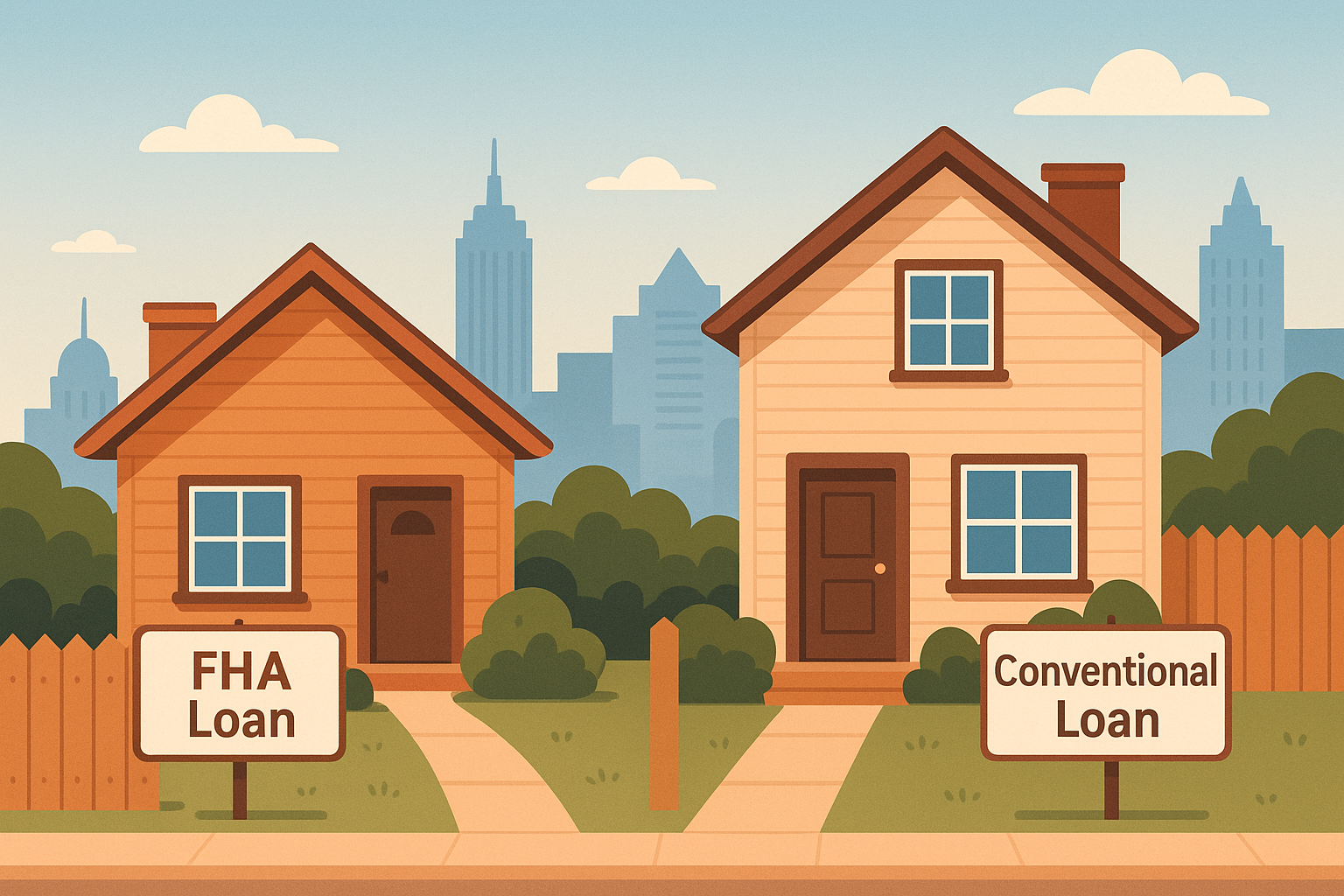FHA loans and conventional loans have different credit score requirements, which impact your down payment, interest rates, and loan terms. Here’s the key takeaway:
-
FHA Loans: Ideal for lower credit scores (minimum 500).
- 580+: 3.5% down payment.
- 500–579: 10% down payment.
- Below 500: Not eligible.
-
Conventional Loans: Require a minimum credit score of 620.
- Higher scores (700+) unlock better rates and terms.
Quick Comparison Table:
| Loan Type | Minimum Credit Score | Down Payment | Mortgage Insurance | Interest Rates |
|---|---|---|---|---|
| FHA Loans | 500 (with 10% down) | 3.5%–10% | Required for the life of the loan | Higher for lower credit scores |
| Conventional Loans | 620 | 3%–20% | Can be removed after 20% equity is reached | Better rates with scores 740+ |
Key Considerations for Austin Buyers:
In Austin’s competitive market, conventional loans may appeal more to sellers, but FHA loans remain a strong option for those with lower credit scores or smaller down payments.
NEW Comparing Monthly Payments on FHA vs Conventional …
FHA Loan Credit Requirements
FHA loans make homeownership more accessible for buyers with lower credit scores, offering flexible rules that are especially helpful for first-time buyers.
FHA Minimum Credit Score Rules
The Federal Housing Administration has specific credit score requirements that impact the down payment amount:
- 580 or higher: You’ll need at least a 3.5% down payment.
- 500–579: A 10% down payment is required.
- Below 500: Typically, you won’t qualify for FHA financing.
Here’s what that means for a $400,000 home purchase:
- With a 580 credit score, your down payment would be $14,000 (3.5%).
- With a 550 credit score, you’d need $40,000 (10%).
If you’re buying in Austin’s competitive market, keeping these FHA guidelines in mind is crucial.
Conventional Loan Credit Requirements
To qualify for a conventional loan, you’ll need a minimum credit score of 620. However, approval isn’t solely based on this number – lenders will also assess your overall financial situation [1]. This differs from FHA loans, where the credit score requirements are generally more flexible.
Higher Scores, Better Deals
A stronger credit score can lead to lower interest rates and improved loan terms. Borrowers with higher scores often benefit from smaller down payments and reduced monthly payments, making their financing more affordable in the long run.
sbb-itb-4c99469
FHA vs Conventional Credit Score Guide
Compare the credit requirements for FHA and conventional loans to see which one fits your financial situation better.
Credit Score Comparison Chart
| Loan Feature | FHA Loans | Conventional Loans |
|---|---|---|
| Minimum Credit Score | 580 with 3.5% down 500–579 with 10% down |
620 minimum |
| Down Payment Range | 3.5% (if score is ≥580) to 10% (if score is between 500–579) | 3–20% |
| Typical Interest Rate Range | 0.25–0.5% higher* | 740+: Best rates 700–739: Competitive rates 620–699: Higher rates |
*Interest rate differences depend on individual borrower profiles.
This comparison helps you match your credit profile with the right loan option, especially when navigating the challenges of your local housing market.
Who Chooses Each Loan Type
FHA loans are ideal for borrowers who:
- Have credit scores around 580
- Need a smaller down payment
- Are working on building or improving credit
- Are buying a home for the first time
Conventional loans are better for borrowers who:
- Have credit scores of 700 or higher
- Can afford a larger down payment
- Want to avoid mortgage insurance
- Are buying higher-priced homes
In competitive markets like Austin, conventional loans can be more appealing to sellers, especially in bidding wars. However, FHA loans remain a strong option for buyers needing more flexible credit terms as they take their first steps toward homeownership. Understanding these differences is key to making an informed choice.
Austin Market Loan Considerations
Austin Market Factors
With property values climbing in Austin, some homes may exceed FHA loan limits, making conventional loans a more practical option. To understand how these trends impact your financing choices, reach out to local experts. They can provide insights into current property values and guide you through any challenges the market presents.
Austin Local Team Services
Expert advice can simplify the loan process in Austin. The Austin Local Team offers tailored services to assist buyers with financing decisions:
| Service | How It Helps |
|---|---|
| Agent Matchmaking | Connects you with agents familiar with FHA and conventional loans |
| Market Analysis | Provides up-to-date property values and market trends |
| Property Search | Helps locate homes that meet specific loan program criteria |
| Local Insights | Offers guidance on neighborhood factors influencing loans |
Their comparative market analysis aligns property values with lending requirements, helping buyers make informed choices. This is especially useful when deciding between FHA and conventional loan options across various Austin neighborhoods.
Making Your Loan Choice
Loan Type Comparison: Pros and Cons
Here’s a quick breakdown of the main differences between FHA and conventional loans:
| Loan Feature | FHA Loans | Conventional Loans |
|---|---|---|
| Mortgage Insurance | Required for the life of the loan* | Can be removed once 20% equity is reached |
| Interest Rates | Higher for lower credit scores | Best rates typically available with scores of 740+ |
| Property Standards | Must meet stricter inspection guidelines | Generally more lenient requirements |
| Loan Limits | Usually lower | Potential for higher lending limits |
*Note: FHA mortgage insurance rules may vary depending on the loan details.
Now that you’ve seen the differences, let’s look at what steps you should take based on your credit score.
Steps to Take Based on Your Credit Score
Choosing the right loan depends on your credit score and how it fits into Austin’s competitive housing market:
- Scores below 620: FHA loans are often your best bet. They’re designed for borrowers with lower credit scores and smaller down payments. Consider working with a credit counselor to boost your score over time.
- Scores between 620 and 740: You’ll want to compare FHA and conventional loan options. Look at the full picture, including monthly payments, mortgage insurance, interest rates, and down payment requirements.
- Scores above 740: Conventional loans usually offer the best terms. You’ll likely benefit from lower interest rates, reduced insurance costs, and higher borrowing limits.
In a fast-moving market like Austin, getting pre-approved can give you an edge when making an offer. Mortgage professionals can help you assess your credit profile and find the loan that works best for you. For local expertise, the Austin Local Team (https://localteam.ai) can connect you with real estate professionals who understand the unique lending landscape in Austin.
FAQs
What are the pros and cons of choosing an FHA loan instead of a conventional loan in Austin’s competitive housing market?
FHA loans and conventional loans each come with unique advantages and drawbacks, especially in a competitive market like Austin. FHA loans are popular with first-time buyers because they typically require lower credit scores (as low as 580) and smaller down payments (as little as 3.5%). This makes them more accessible for buyers with limited savings or credit challenges. However, FHA loans require mortgage insurance premiums (MIP), which can increase your overall costs.
Conventional loans, on the other hand, often require higher credit scores (usually 620 or above) and larger down payments, but they don’t always require private mortgage insurance (PMI) if you put down at least 20%. This can save you money in the long run. Additionally, sellers in Austin’s competitive market may favor buyers with conventional loans, as they are often seen as less risky.
Understanding which loan suits your financial situation and goals is crucial. If you’re unsure, consider connecting with a local real estate expert who can guide you through the process and help you make an informed decision tailored to Austin’s housing market.
What is the difference in credit score requirements for FHA loans and conventional loans, and how does it affect interest rates and mortgage insurance?
FHA loans typically have more lenient credit score requirements, making them a great option for first-time homebuyers or those with lower credit scores. You can qualify for an FHA loan with a credit score as low as 500 (with a 10% down payment) or 580 (with a 3.5% down payment). Conventional loans, on the other hand, generally require a higher credit score, often 620 or above, to qualify.
Your credit score also impacts interest rates and mortgage insurance costs. For FHA loans, mortgage insurance is required regardless of your credit score, but the premiums are usually fixed. With conventional loans, higher credit scores can help you secure lower interest rates and potentially avoid private mortgage insurance (PMI) if your down payment is 20% or more. This makes understanding your credit score and loan options crucial when choosing the right mortgage for your needs.
How can I improve my credit score to qualify for better loan terms, and what impact could this have on my loan options in Austin?
Improving your credit score can help you qualify for better loan terms, such as lower interest rates and more favorable repayment options. Here are some steps to boost your credit score:
- Pay bills on time: Consistently making on-time payments is one of the most important factors in improving your credit.
- Reduce credit card balances: Aim to keep your credit utilization below 30% of your credit limit.
- Avoid opening new credit accounts: Too many recent credit inquiries can temporarily lower your score.
- Check your credit report for errors: Dispute any inaccuracies that could be negatively impacting your score.
In Austin, a higher credit score could open up more options for both FHA and conventional loans. FHA loans generally have more lenient credit requirements, making them a great choice for first-time buyers with lower scores. However, if you improve your credit, you may qualify for a conventional loan, which could offer lower monthly payments or eliminate the need for mortgage insurance. Taking these steps not only increases your chances of approval but also helps you secure a loan that fits your financial goals in Austin’s competitive housing market.






